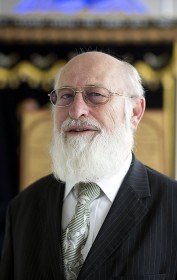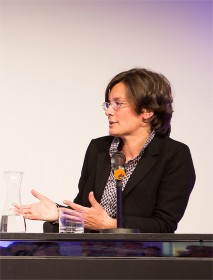In the summer of 2012, there was an intense discussion in Germany about whether the circumcision of boys constitutes bodily harm under the law. Preceding this so-called ‘circumcision debate’ was a decision by Cologne’s district court that criminalized the ritual circumcision of boys. A high point in the debate occurred when a German doctor registered a legal complaint against Rabbi David Goldberg, of Hof, claiming that he was liable for “dangerous personal injury” due to the circumcisions he performed. I spoke with him about the complaint, and about his feelings as well as the reactions that he encountered during that period.

Rabbi David Goldberg © private
Dear Rabbi Goldberg, how did it happen that you were reported?
That’s easy to explain: I’m known in Germany as a circumciser and I’m easy to find through my website. Opponents of circumcision were looking for a sacrificial victim and they found it in me. Because the people who made the complaints against me…
… there were more than one?
Yes, there were a number of them. But the people behind them didn’t even know me. They were simply looking for a scapegoat.
How was it for you during that period?
→ continue reading

Cover of the Graphic novel © Reinhard Kleist, The Boxer, Selfmadehero 2014
Several of us at the Jewish Museum Berlin have observed that, over the last few years, the market for young adult literature has begun to demonstrate a growing interest in the subject of Nazism and the Holocaust. In the coming weeks, we will be introducing contemporary and classic works on this topic that we have read and discussed together.
What happened to the people who survived the concentration camps – what was life like afterwards? For their families, their children, the survivors themselves?
Alan Scott Haft’s father Hertzko Haft was a vicious and violent man, the polar opposite of what we would consider today to be a “good father.” Many years passed before Alan Scott Haft understood – and he didn’t really want to know – why his father was that way.
At some point he learned a little more: → continue reading

Dr. Karen Körber, the first scholar ever to benefit from the Fellowship Program of the Jewish Museum Berlin © JMB, Photo: Ernst Fesseler
The Jewish community in Germany has undergone a profound change in recent years—and the protagonists behind that change are the primary focus of research undertaken by Dr. Karen Körber, the first scholar of the Fellowship Program of the Jewish Museum Berlin. For the last two years Dr. Körber has been investigating “Daily Realities: Jewish Life in Germany Today” and she recently spoke to me about her findings.
Karen, the Fellowship Program of the JMB supports research into Jewish history and culture as well as into broader-ranging aspects of migration and diversity in Germany. You are the first person ever to complete the two-year Fellowship Program—a pioneer, so to speak—and I’d be interested to hear about that experience.
I found myself in a very open situation and was able to do much as I liked. All fellowship programs are fundamentally privileged set-ups but this particular one has the advantage of being attached to a well-endowed institution of international renown. → continue reading


